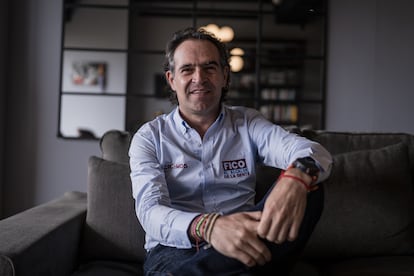The Colombian region of Antioquia is a counterweight to President Petro
The most populous department in Colombia has sworn in two strong critics of the president as leaders


“President Petro, don’t punish us for representing the opposition: it’s a serious mistake. Medellín and Antioquia are Colombia,” said the mayor of Colombia’s second-largest city, at his inauguration ceremony this past Monday, January 1. Federico Fico Gutiérrez thus sent a message that was echoed by the governor of Antioquia, Andrés Julián Rendón, who took office the same day. He, too, challenged the leaders of the national government: “If they don’t support Antioquia, they should at least leave us alone.” Thus, from their first moment in power, the new duo of rulers made it clear that the richest and most populous department (the equivalent of a state) in Colombia — or, at least, those who currently run the local governments — will be a counterweight to Gustavo Petro.
This political posturing isn’t surprising. Gutiérrez and Rendón come from the right, while Petro is the first left-wing president of contemporary Colombia. Federico, or “Fico” — a politician who has had the luxury of being close to former President Álvaro Uribe (2002-2010) without ever having joined his Democratic Center party — previously served as the mayor of Medellín from 2016 until 2020. He placed third in the 2022 presidential elections. Uribe supported him, while Gutiérrez campaigned as a starkly different alternative to Petro, who eventually won. Two years later, Fico has been elected mayor again.
Fico’s position is radical: last year, he denounced Petro for the alleged illegal financing of his 2022 campaign, after the scandal caused by the president’s firstborn son, Nicolás Petro. He then coasted to his re-election as mayor last October, thanks to the fact that the city is strongly opposed to the incumbent government, while Daniel Quintero — the former mayor who had aligned himself with the president — became deeply unpopular.
Rendón — a lesser-known figure outside Antioquia — won the governorship with the endorsement of the Democratic Center. He was formerly the mayor of Rionegro, a wealthy suburb of Medellín. It’s home to the international airport (and to Uribe). The two men teamed up for the regional elections last October.
The current governor has repeatedly accused the president of being an enemy of the department. “From Antioquia, we will face a Petro who hates the people of Antioquia.” “Antioqueños, your love and your vote will help us block Petro.” “It’s Petro, or it’s Antioquia.” These were just some of the slogans that were heard on the street, on TV and on social media during the gubernatorial campaign.
In the first days of his mandate, two key issues have materialized… and concerning both, Governor Rendón has made his demands clear. The first is that the Government of Antioquia wants to be in charge of all mining projects within its territory. Rendón wants to be able to approve or revoke mining licenses and supervise an economic activity that has deep historical roots in a region that lived off of gold extraction throughout the colonial era. Even today, Antioquia represents about half of Colombia’s total gold production.
However, on December 26, the government in Bogotá decided to not extend this jurisdiction, which had been in effect since 2013. This sparked annoyance in the region. “It’s an act of revenge towards Antioquia,” said outgoing Governor Aníbal Gaviria. Rendón took it a step further: “I’ve decided to form a legal team of the highest level to fight — from an administrative and constitutional point of view — to recover the mining [rights] of Antioquia,” he announced, on the day of his inauguration.
Petro has supported his decision with legal arguments, but also with policy positions that deepen the distance between the leaders. “My dear governor, mining in Antioquia has largely been dominated by armed groups. [It] has spread to fertile lands and areas with high environmental sensitivity. It doesn’t seem like a good balance to me. I propose a mining model that prioritizes the small miner and I propose that agricultural areas be respected in their agricultural vocation,” he retorted, the day after the debate broke out.
There has been a similar fight when it comes to the second issue: fourth-generation road concessions, or 4G roads. Structured by the administration of President Juan Manuel Santos (2010-2018) about a decade ago in different regions, they have special importance in a department so steep that its capital, Medellín, is known as the “mountain capital.” In fact, 4G came from a previous project that was started by the Uribe administration, to build several roads in Antioquia. Santos took up the idea, added roads to other regions and — with environmental, financial and legal adjustments — took 4G forward.
In Antioquia, several of these roads have sections pending. The regional government has asked Bogotá for additional funds to finance them. But the answer, so far, has been negative. “We have a financing problem, but not with the 4G in Antioquia. [Our issue is] with the roads in Colombia,” Minister of Transportation William Camargo told EL PAÍS in October. He explained that the roads in question are additional works that have been proposed by the companies in charge of the construction and maintenance of the highways, or by the communities. He claimed that there’s no money for it. “It cannot be argued that Antioquia hasn’t received resources: of the $50 billion in fourth-generation concessions, approximately $28 billion materialized in concessions that pass through that department,” the minister argued.
Rendón brought up the matter on the day of his inauguration. “If they don’t want to finish the Mountain Highways, let [the federal government] hand them over to us, because we’ll finish them here.” Previously, during the campaign, he affirmed that “Petro’s hatred towards Antioquia is limitless: he took the money from us to finish the 4G roads.”
Although he hasn’t commented directly on the two issues, Fico has accused Petro of punishing a region that didn’t vote for him in the presidential elections and has now elected his opponents. “Attacking a region due to political and ideological differences with its leaders is an attack on the unity of the country,” he said, on the day that the government’s decision on mining was announced.
The fight is on. More issues have emerged, such as the federal government’s role in the local health system or Petro’s criticism of the Hidroituango hydroelectric plant, another megaproject led by the regional and municipal governments. From healthcare reform to Petro’s “total peace” policy, the governor and the mayor have clashed with the president on his flagship issues.
Ideologically opposed to Petro — and with enough resources to carry out their administrations without depending on the federal government — Fico and Rendón are incentivized to be a counterweight to the executive branch, especially when Petro is polling poorly in Antioquia. As the opposition to the president has no clear leadership, there’s room to be noticed.
Sign up for our weekly newsletter to get more English-language news coverage from EL PAÍS USA Edition
Tu suscripción se está usando en otro dispositivo
¿Quieres añadir otro usuario a tu suscripción?
Si continúas leyendo en este dispositivo, no se podrá leer en el otro.
FlechaTu suscripción se está usando en otro dispositivo y solo puedes acceder a EL PAÍS desde un dispositivo a la vez.
Si quieres compartir tu cuenta, cambia tu suscripción a la modalidad Premium, así podrás añadir otro usuario. Cada uno accederá con su propia cuenta de email, lo que os permitirá personalizar vuestra experiencia en EL PAÍS.
¿Tienes una suscripción de empresa? Accede aquí para contratar más cuentas.
En el caso de no saber quién está usando tu cuenta, te recomendamos cambiar tu contraseña aquí.
Si decides continuar compartiendo tu cuenta, este mensaje se mostrará en tu dispositivo y en el de la otra persona que está usando tu cuenta de forma indefinida, afectando a tu experiencia de lectura. Puedes consultar aquí los términos y condiciones de la suscripción digital.








































